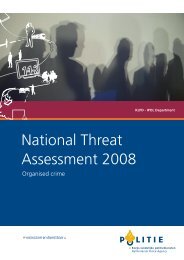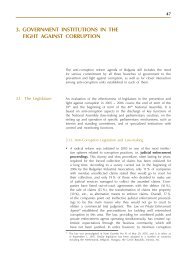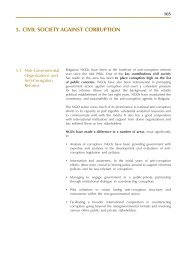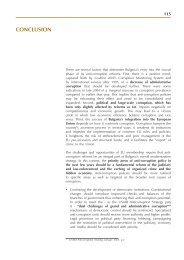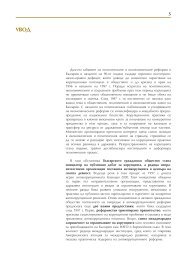Assessing the Effectiveness of Organized Crime Control Strategies ...
Assessing the Effectiveness of Organized Crime Control Strategies ...
Assessing the Effectiveness of Organized Crime Control Strategies ...
Create successful ePaper yourself
Turn your PDF publications into a flip-book with our unique Google optimized e-Paper software.
<strong>Assessing</strong> <strong>the</strong> <strong>Effectiveness</strong> <strong>of</strong> <strong>Organized</strong> <strong>Crime</strong> <strong>Control</strong> <strong>Strategies</strong>:<br />
A Review <strong>of</strong> <strong>the</strong> Literature<br />
Stewart (1980:124) refers to <strong>the</strong> investigative grand jury as:<br />
<strong>the</strong> single most useful tool by which to attack <strong>the</strong> traditional forms <strong>of</strong> organized<br />
crime…If <strong>the</strong> witness testifies truthfully, that witness will be ostracized from <strong>the</strong><br />
criminal community and <strong>the</strong>reby neutralized as an organized crime<br />
operative…Whenever any appreciable number <strong>of</strong> lower-level <strong>of</strong>fenders are<br />
summoned before an investigative grand jury, <strong>the</strong> higher-ups in <strong>the</strong> organized crime<br />
structure can never be sure what, if anything, is being said. This alone is sufficient to<br />
generate tensions within <strong>the</strong> organized crime structure.<br />
On <strong>the</strong> negative side, some prosecutors have used <strong>the</strong> grand jury to harass those viewed as<br />
political undesirables. This happened, for example, to antiwar activists in <strong>the</strong> 1970s (Kenney<br />
and Finckenauer, 1995).<br />
The merits <strong>of</strong> investigative grand juries is a matter <strong>of</strong> conjecture as <strong>the</strong> evidence thus far<br />
advanced is anecdotal. Albanese (1996:196) asserts that: “Unfortunately, <strong>the</strong>re has been no<br />
objective evaluation <strong>of</strong> <strong>the</strong> benefits (in terms <strong>of</strong> multi-jurisdictional organized crime<br />
prosecutions) versus <strong>the</strong> costs (in terms <strong>of</strong> harassment, unwarranted privacy invasions, and Fifth<br />
Amendment issues) <strong>of</strong> investigative grand juries.”<br />
4.11 Citizens’ Commissions, Police Commissions, and Community-Based<br />
Initiatives<br />
Citizens’ commissions have been established periodically in <strong>the</strong> US to deal with crime-related<br />
issues. Among <strong>the</strong> most productive have been <strong>the</strong> Chicago and Pennsylvania crime<br />
commissions. These investigative commissions have been helpful in <strong>the</strong> investigation <strong>of</strong> OC.<br />
Prosecutors report that information and intelligence received from crime commissions have been<br />
useful in identifying areas for fur<strong>the</strong>r investigation and in developing cases for prosecution<br />
(Albanese, 1996:182).<br />
Rogovin and Martens (1994: 389-90) indicate that crime commissions can be:<br />
1. Publicly funded, where investigators have police status but no arrest powers and usually<br />
no prosecutorial authority (e.g., Pennsylvania <strong>Crime</strong> Commission);<br />
2. Privately funded with no policing authority (e.g., Chicago <strong>Crime</strong> Commission);<br />
3. Government-sponsored, temporary, and designed to investigate a specific incident or<br />
phenomenon (e.g., President’s Commission on <strong>Organized</strong> <strong>Crime</strong>, Quebec Police<br />
Commission, Knapp Commission on police corruption).<br />
Albanese (1996) notes that aside from <strong>the</strong>ir contribution in investigating OC, <strong>the</strong>se commissions<br />
focus <strong>the</strong> public’s attention on <strong>the</strong> issue through <strong>the</strong>ir hearings, reports, and publicity. It has also<br />
been found that witnesses are more likely to disclose <strong>the</strong>ir knowledge to <strong>the</strong>se commissions<br />
because <strong>the</strong>ir main task is to collect information, ra<strong>the</strong>r than build specific cases. In addition,<br />
38 | Research and Statistics Division / Department <strong>of</strong> Justice Canada



